Villages as Pillar of Post-Covid-19 National Economic Recovery:
Building Villages and Seizing the Opportunity for BUMDES
Hana Fajria – FEB UI Public Relations Officer
Depok – The Economic and Community Research Institute (LPEM) at the Faculty of Economics and Business, Universitas Indonesia, held a national webinar entitled Villages as Pillar of Post-Covid-19 National Economic Recovery:
Building Villages and Seizing the Opportunity for BUMDES on Friday (12/6/2020).
The keynote speakers at the webinar were Budi Arie Setiadi, deputy minister of villages, development of disadvantaged regions and transmigration (Kemendes PDTT), and Dr. Beta Yulianita Gitaharie, Acting Dean of FEB UI. The webinar also invited speakers Mohammad D. Revindo, Ph. D (head of the Business Climate and Global Value Chain Research Group, LPEM FEB UI), Drs. Nugroho S. Nugroho, M.Si (director of village business development, Kemendes PDTT), Marthen Ragowino Bira (village-owned enterprise [Bumdes] Iyya Tekki, Tebara village, West Sumba, East Nusa Tenggara), Agus Sudrikamto (Bumdes Singosari, Malang), and Rudy Suryanto, SE, M.Acc., AK., CA (Bumdes consultant).
Beta Yulianita Gitaharie said in her speech that the webinar was expecfed to contribute ideas or input for the formulation of policies that support the development of disadvantaged villages and transmigration.
Meanwhile, Budi Arie Setiadi said villages must be the main force in restoring national economic resilience after the Covid-19 pandemic amid the threat of a global economic contraction of up to minus 7.2%. However, to make this happen, villages face various challenges, including the fact that 13,577 villages do not have Internet access. In addition, 433 villages have no electricity.
To make villages the main force of the post-Covid-19 national economy, mutual cooperation of all elements of the nation is the key in making and implementing innovation.
According to Budi, to welcome the new normal, Bumdes need to create breakthroughs to drive village economy, not just to meet the needs of the domestic market but also to serve foreign markets.
“Of the 74,953 villages, 3,540 villages are disadvantaged and 17,633 villages are underdeveloped. This is a big challenge for us for the next several years,” he added. Budi also said that Bumdes are a socio-economic instrument for villagers to progress. Currently, only 18,195 Bumdes have been included in the village profile and another 4,651 Bumdes classified as advanced.
“We hope that with the cooperation of all parties, private and state-owned enterprises as well as academicians, we can increase the potentials of Bumdes in Indonesia,” said Budi Arie.
Marthen Ragowino Bira explained that Bumdes Iyya Tekki of Tebara village, West Sumbawa, East Nusa Tenggara, plays mediation role to strengthen village business players so that they do not compete with one another and do not crowd out others.
Agus Sudrikamto from Bumdes Singosari, Malang, explained that collaboration among BUMDes is important to ensure that Bumdes trade activity can guarantee adequate supply of basic needs at low prises and minimize the risks of a decrease in savings and business loans due to Covid-19.
Rudy Suryanto explained the characteristics of a successful Bumdes, village communities and village decentralization. Mohammad D. Revindo, Ph. D. talked about strengthening Bumdes to develop village economy after the pandemic as well as the criteria of a successful Bumdes.
Nugroho S. Nugroho, M. Si closed the webinar with a summary of government policies concerning the revitalization and digitization of Bumdes. Reborn Villages are expected to become tourism villages, with marketing supported by digital technology. Bumdes should also be strengthened to keep investment in villages so that the basis of village economy is maintained. As Bumdes is not incorporated into the national economic program, it is recommended that a village fund is set up to strengthen Bumdes capital. (hjtp)
The video of the webinar is available at the following link:
https://www.youtube.com/watch?v=TKrvlll3AHk
(lem)




